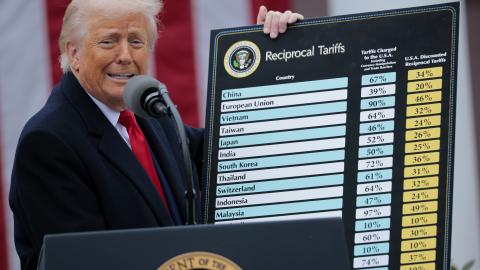President Trump is the ultimate outsider—a bold businessman who asks uncomfortable questions that typical policymakers are too squeamish to ask. Germans know this all too well: Trump was right when he took on Chancellor Merkel on NordStream II and defense spending. Trump’s approach to trade is tough because, for decades, he saw how tough globalization has been for many working class Americans.
Trump is willing to take significant risks to rebalance the trading order for these forgotten Americans — and that has ruffled feathers in Brussels and European capitals. Some have condescendingly dismissed Trump’s unconventional method as chaos. That is a profound mistake. Trump's disruptive tactics reveal something deeper: the urgent need for a more honest and sustainable transatlantic economic relationship.
European leaders may dislike Trump's methods, but they should appreciate his clarity about power dynamics. The previous approach—lengthy multilateral processes that allowed bad actors to game the system—has demonstrably failed to create sustainable trade relationships or to address China's mercantilist threat to both the US and the EU.
Trump's confrontational style is no accident — it's central to forcing long-overdue negotiations. And it works. His pressure on NATO allies to significantly increase defense spending has strengthened the alliance. His trade provocations serve a similar purpose: ending the cozy arrangements that have allowed many nations to free-ride on the American economy.
The Digital Services Tax (DST) controversy perfectly illustrates this dynamic. European nations implemented these taxes to target American tech giants—essentially attempting to appropriate portions of the US tax base. When Canada tried to impose a similar scheme, Trump escalated pressure and Canada quickly agreed to withdraw its DST. This wasn't capitulation; it was recognition that sustainable partnerships require mutual respect, not unilateral advantage-taking.
Trump has now set a standard in American policymaking of standing up for American workers and consumers.
Frustration with European trade negotiation tactics spans decades and crosses party lines in Washington. Trump’s dissatisfaction with Merkel was legendary. Less well known is that when Merkel proposed a comprehensive EU-US trade agreement to President Bush, US officials deflected the proposal because they had zero confidence that a liberalizing trade agreement could be negotiated with the EU. The Obama administration's attempt at the Transatlantic Trade and Investment Partnership (TTIP) went virtually nowhere despite years of effort.
European leaders may blame American intransigence for these failures, but they should recognize an uncomfortable truth: US policymakers of all persuasions, from both parties, have found the EU's negotiating approach deeply frustrating. The pattern is consistent—grand pronouncements followed by endless procedural complications that prevent meaningful reform. Trump’s decades in real estate have given him unique insight in seeing past the procedural to the tangible.
The EU has significant economic leverage as the world's largest trading bloc. But leverage only matters if it is used constructively. As both Chancellor Merz and Prime Minister Meloni have wisely recommended, Europe should abandon its reflexive preference for process over outcomes and instead negotiate for specific, measurable policy change that benefits both sides.
Buying more US LNG and increasing arms purchases are important first steps Europe should take that are in Europe’s own self-interest, but Europe needs to work with Trump's team on broader, concrete terms rather than hoping to outlast his presidency through delay tactics.
Most importantly, these delays suit the common adversary of Europe and the US: China which has systematically distorted global markets. China's export dominance isn't simply the result of competitive advantages—it's the product of a domestic economic model that suppresses consumption and artificially subsidizes production through financial repression.
Chinese households save excessive amounts not by choice, but because their government provides inadequate social safety nets and restricts investment. This forced savings glut gets channeled into massive industrial subsidies, creating overcapacity that floods global markets with artificially cheap goods. The result damages industrial bases in both Europe and America.
China's export policies are deeply embedded in its authoritarian governance model, making them extremely difficult to change through conventional diplomatic pressure. But Europe and America, working together, have the market power to challenge the PRC’s distorted practices.
Trump's willingness to use America's economic leverage forces nations to make difficult but necessary decisions rather than hiding behind diplomatic niceties. For Europe, this creates an opportunity: engage seriously on trade reform and China policy and gain a powerful ally in reshaping global economic rules. Resist, and the EU risks being sidelined as America pursues bilateral solutions.The choice for Europe is clear: adapt to this new reality and help shape it, or watch from the sidelines as the global economic order takes shape without European input.
Trump’s focus on uncomfortable questions isn’t going away—and neither are the underlying problems they reveal. Europe's best strategy is to engage constructively with his administration while it has the chance to influence outcomes. The alternative—waiting for a weaker American president—is a luxury Europe can no longer afford in an era of intensifying great power competition.















